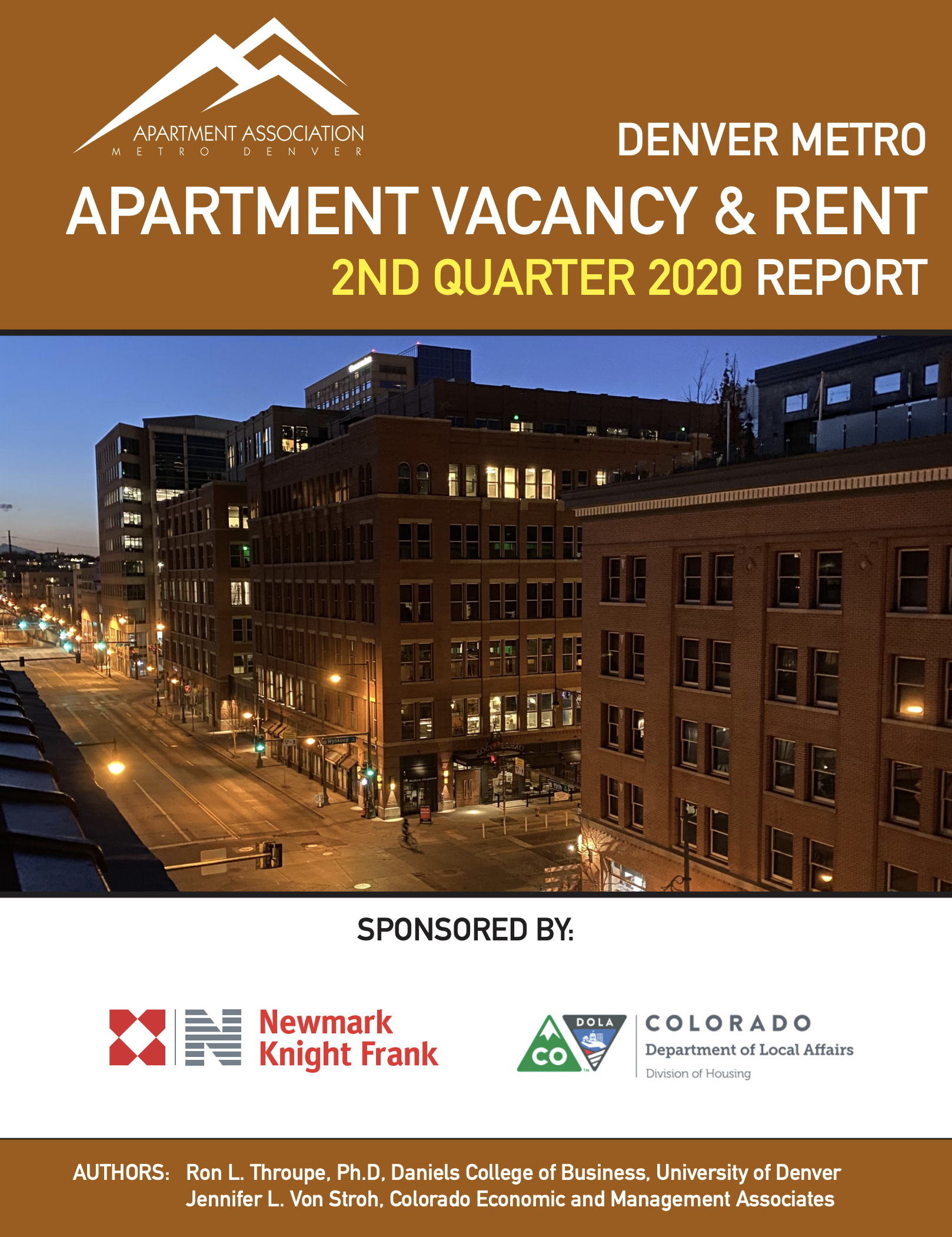Rents Across Metro Denver Decrease in Q2 - Demand remains strong for Rental Housing
Denver (July 21, 2020) – Today, the Apartment Association of Metro Denver released Q2 2020 results from the quarterly Denver Metro Area Apartment Vacancy and Rent Survey conducted by the University of Denver’s Daniels College of Business and Colorado Economic Management Associates.
Compared to Q2 2019, average rent decreased to $1,506 per month, a $30 monthly decrease, a $360 annual decrease. This represents an inflation-adjusted 2.1% decrease in rents, and the first time in more than a decade that the Denver market saw negative year-over-year rent growth. The last time rents were lower than the period 12 months earlier was in Q1 of 2010.
"This report is good news for future renters," said Mark Williams, executive vice president of the Apartment Association of Metro Denver. "Not only are rents not climbing, they went down for all but one floorplan type. There were decreases in all categories, except for two-bedroom, one-bathroom units. This is likely because a renter who had an extra bedroom has added a friend to his or her lease."
The decrease in rent was consistent across most geographies in 24 out of 36 submarkets – nearly every age of apartment and nearly every size apartment saw declines in rental prices. Newer properties showed the steepest decreases in rents, as properties built in 2010 now have average rents of $1,840, a $105 drop from last quarter. Properties built in the 1970s remain the least expensive to rent, averaging 20% less than average rental costs for all apartments.
The Q2 survey was modified to collect COVID-19-specific data, asking about delinquency patterns for the months of April, May, and June of 2020. The results demonstrated that delinquency was very low, with a majority of rental providers responding that over 95% of renters paid their rent.
“This Q2 report continued to show relative stability in the apartment market,” said Williams. “which was difficult to predict at the start of the COVID-19 pandemic. Over the past few months, housing providers have worked closely and diligently with residents who were impacted by COVID-19 economic hardships to create flexible payment plans and creative solutions that were a win-win for everyone involved.”
The Denver Metro apartment market added 1,170 new units with a net-positive absorption of 3,801 units for the second quarter.
"This means over 3,800 (more) apartments have been rented today than in March 2020 when the COVID-19 situation started to evolve, indicating that demand for rental housing is still very strong," Williams explained.
The survey found that the average overall vacancy was 5.1%, which is down from 5.9% from last quarter, but virtually flat compared to a year ago. This is in line with historical patterns, which show slightly higher vacancy in the first quarter compared to the second and third quarters.
“Vacancy continues to be low, and we are still well below the market’s long-run average of 6.8%” said Teo Nicolais, a Harvard Extension School instructor specializing in real estate. “We historically see second quarter vacancy lower than the prior quarter. This has been the case for each of the last 11 years.”
In Q2, discounts and concessions were steady, coming in at $84, compared to $88 in the first quarter. New construction of apartments continued to slow in the second quarter, as year-over-year construction of 8,978 units is the lowest number on record since the second quarter of 2016.
The Denver Metro Area Apartment Vacancy and Rent Report is coordinated and published by the Apartment Association of Metro Denver. The survey is conducted by the University of Denver’s Daniels College of Business and Colorado Economic and Management Associates and is sponsored by the Colorado Division of Housing and Newmark Knight Frank Multifamily.
The quarterly Vacancy and Rental Rate Survey is authored by Ron L. Throupe, Ph.D. of the University of Denver Daniels College of Business, and Jennifer L. Von Stroh of Colorado Economic and Management Associates. It has served as a reliable source for comprehensive data and analysis for over 39 years and is made possible through the ongoing participation of the apartment industry and broad support from private and public sector sponsors.
DOWNLOAD THE 2ND QUARTER 2020 REPORT

Full Report (Subscribers Only; Login Required)
Executive Summary (Login Required)
